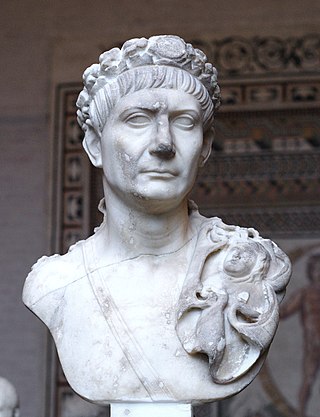Related Research Articles
The gens Bruttia was an ancient Roman family during the late Republic and into imperial times. None of the gens obtained any important magistracies until the latter half of the first century AD, when Lucius Bruttius Maximus was proconsul in Cyprus.
Lucius Fabius Cilo, full name Lucius Fabius Cilo Septiminus Catinius Acilianus Lepidus Fulcinianus, was a Roman senator, who was a confidant of Septimius Severus. He held a number of appointments that have been dated to the reigns of Commodus and Severus. He was twice Roman consul: the first time in 193 as a suffect, and the second time as ordinary consul in 204 with Marcus Annius Flavius Libo as his colleague. Cilo is known from numerous inscriptions and appears in the Historia Augusta and the history of Dio Cassius. He married Cilonia Fabia.

Bruttia Crispina was Roman empress from 178 to 191 as the consort of Roman emperor Commodus. Her marriage to Commodus did not produce an heir, and her husband was instead succeeded by Pertinax.
Gaius Bruttius Praesens Lucius Fulvius Rusticus was an important Roman senator of the reigns of the emperors Trajan, Hadrian and Antoninus Pius. A friend of Pliny the Younger and Hadrian, he was twice consul, governed provinces, commanded armies and ended his career as Urban prefect of Rome. Bruttius’ life and career left few coherent traces in the literary record, but a number of inscriptions, including his complete cursus honorum, fills out the picture considerably.
Lucius Fulvius Gaius Bruttius Praesens Laberius Maximus was a Roman senator who held a number of imperial appointments during the reigns of emperors Antoninus Pius, Marcus Aurelius and Commodus, and was twice consul. Although he was the recipient of one of the letters of Pliny the Younger, most of what we know about him comes from inscriptions.
Manius Laberius Maximus was a Roman senator and general, who was active during the reign of Domitian and Trajan. He was twice consul: the first time he was suffect consul in the nundinium of September to December 89 AD as the colleague of Aulus Vicirius Proculus; the second time as ordinary consul in 103 as colleague to the Emperor Trajan.
Gaius Asinius Protimus Quadratus was a Roman senator, who was active during the Severan dynasty. He is known entirely from inscriptions.
Publius Septimius Geta was the second son to the elder Publius Septimius Geta and brother of the emperor Septimius Severus. His mother was Fulvia Pia. He was born and raised in Leptis Magna. He had Italian Roman ancestry on his mother's side, and was descended from Punic forebears on his father's side.
Quintus Anicius Faustus was a Roman military officer and senator who was appointed suffect consul in AD 198.
Lucius Valerius Messalla Thrasea Priscus was a Roman senator active during the reigns of Commodus and Septimus Severus.
The gens Caecinia was a plebeian family of Etruscan origin at ancient Rome. Members of this gens are first mentioned in the time of Cicero, and they remained prominent through the first century of the Empire, before fading into obscurity in the time of the Flavian emperors. A family of this name rose to prominence once more at the beginning of the fifth century.
Quintus Tineius Sacerdos was a Roman senator. He is attested as Consul Suffectus 16 March 193 with Publius Julius Scapula Priscus.
Quintus Tineius Clemens was a Roman senator. He was Consul Ordinarius in AD 195 with Publius Julius Scapula Tertullus Priscus.

The gens Ulpia was a Roman family that rose to prominence during the first century AD. The gens is best known from the emperor Marcus Ulpius Trajanus, who reigned from AD 98 to 117. The Thirtieth Legion took its name, Ulpia, in his honor. The city of Serdica, modern day Sofia, was renamed as Ulpia Serdica.
Quintus Tineius Rufus was a Roman senator who was consul ordinarius in 182 with Marcus Petronius Sura Mamertinus as his consul prior. In 170 he was a member of the college of the Salii Palatini.
The gens Sallustia, occasionally written Salustia, was a plebeian family at ancient Rome. Members of this gens are first mentioned in the time of Cicero, and from that time they attained particular distinction as statesmen and writers. The most illustrious of the family was the historian Gaius Sallustius Crispus, who wrote valuable works on the Jugurthine War and the Conspiracy of Catiline, which still exist.
Popilius Pedo Apronianus was a Roman senator, who was active during the reign of Septimius Severus. He was Roman consul in the year 191 with Marcus Valerius Bradua Mauricus as his colleague.
References
- ↑ Paul Leunissen, Konsuln und Konsulare in der Zeit von Commodus bis Severus Alexander (Amsterdam: Verlag Gieben, 1989), p. 131
- ↑ Leunissen, Konsuln und Konsulare, p. 356
- ↑ Salomies, Adoptive and polyonymous nomenclature in the Roman Empire (Helsinki: Societas Scientiarum Fennica, 1992), p. 107
- ↑ Leunissen, Konsuln und Konsulare, p. 371
- ↑ Leunissen, Konsuln und Konsulare, p. 373